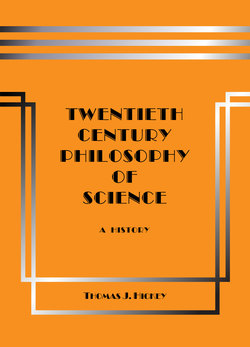Читать книгу Twentieth-Century Philosophy of Science: A History (Third Edition) - Thomas J. Hickey - Страница 83
На сайте Литреса книга снята с продажи.
4.03 Romantic Aim
ОглавлениеThe romantics have a subjectivist social-psychological reductionist aim for the social sciences, which is thus also a foundational agenda. This agenda is a thesis of the aim of the social sciences that is still embraced and enforced by many social scientists. Both romantic philosophers and romantic scientists maintain that the sciences of culture differ fundamentally in their aim from the sciences of nature. Romantics view the aim of the social sciences as the development of explanations in terms of subjective psychological motivations to explain observed social interaction in terms of purposeful human actions in society.
Some romantics call this type of explanation “interpretative understanding” and others call it “substantive reasoning”. Using this concept of the aim of social science they often say that an explanation must be “convincing” or must “make substantive sense” to the social scientist due to the scientist’s introspection upon his actual or imaginary personal experiences, especially when he is a participating member of the same culture as the social members he is investigating.
Examples of these romantics are sociologists like Talcott Parsons and his academic entourage, who advocate variations on the philosophy of the sociologist Max Weber, in which vicarious understanding called “verstehen” is a criterion for criticism that they believe trumps empirical evidence. Verstehen sociology is therefore also known as “folk sociology” or “pop[ular] sociology”. Enforcing this criterion has obstructed the evolution of sociology into a modern empirical science in the twentieth century. Cultural anthropologists furthermore reject verstehen as a fallacy of ethnocentrism.
The 1989 Nobel-laureate econometrician Trygve Haavelmo and his academic entourage of classical economists supply another example. These econometricians do not reject the aim of prediction, simulation, optimization and policy formulation using econometric models; with their econometric modeling they enable it. But they subordinate the selection of “explanatory” variables in their models to factors that are derived from their heroically imputed maximizing rationality postulates, which identify the motivating factors explaining the decisions of the economic agents such as buyers and sellers in a market. Thus they exclude econometrics from discovery and limit its function to testing romantic “theory”. In his Philosophy of Social Science Alexander Rosenberg describes the economists’ theory of rational choice, i.e., the use of the maximizing rationality postulates, as “folk psychology formalized”.
Readers wishing to read more about the romantics including Parsons, Weber, Haavelmo and others are referred to BOOK VIII below.
